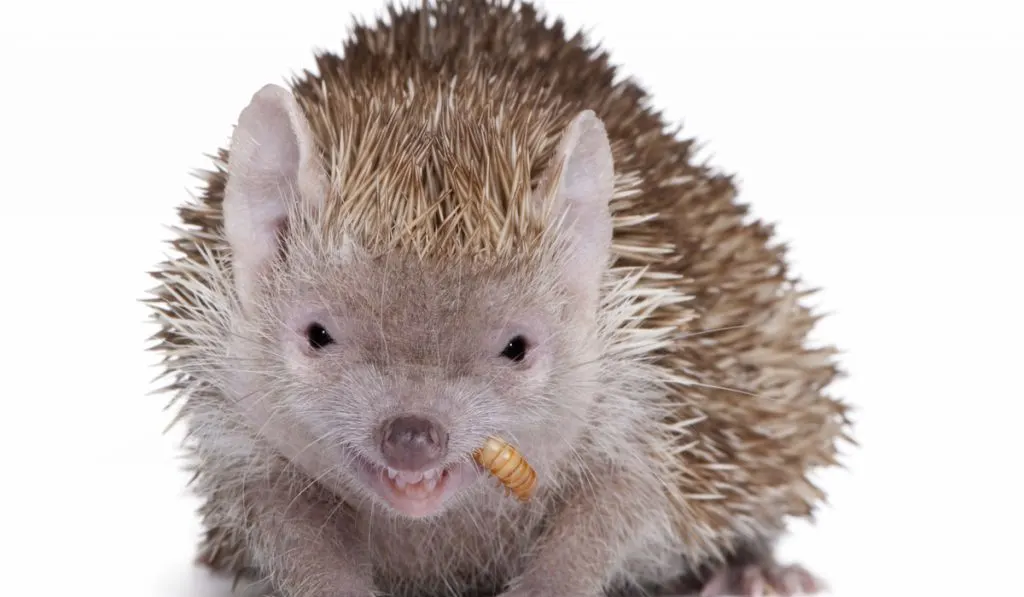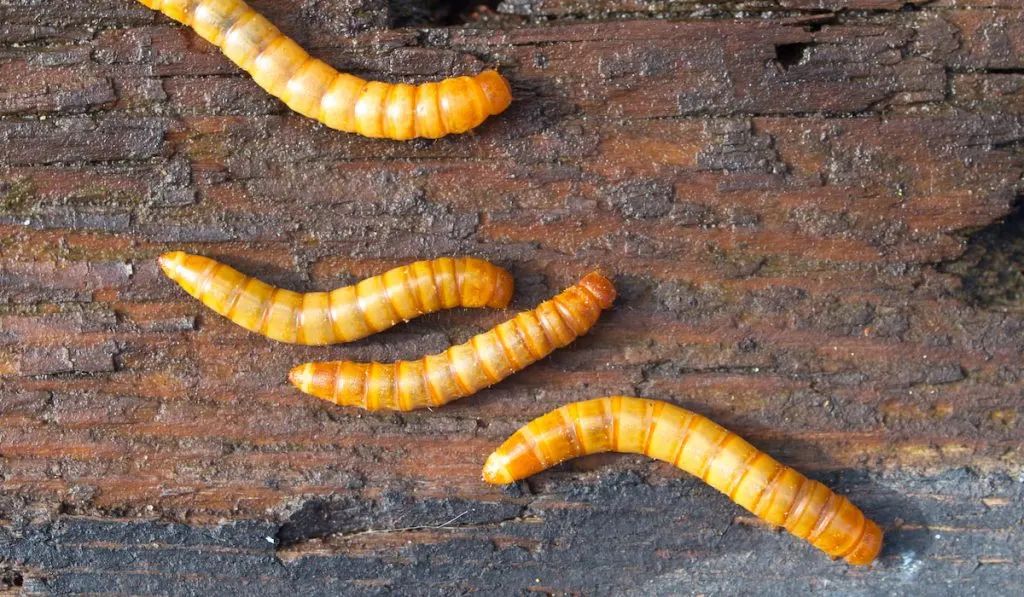Hedgehogs are adorable and they love eating. It’s their favorite pastime. Hedgehogs are prone to obesity because they eat almost anything and are quite greedy eaters.
Of course, not everything they eat is good for their health. Today, we’ll look at mealworms and whether hedgehogs can eat them safely.
Can hedgehogs eat mealworms?
Hedgehogs can eat mealworms but only as a special treat because they are highly addictive and can cause serious health issues. The recommendation is four mealworms a week for pet hedgehogs.

In the case of wild hedgehogs, it’s better to avoid giving them any as they regularly eat mealworms and other insects as part of their diet.
When treating your hedgehog, be sure to give them live mealworms instead of dried ones. Dry mealworms have no nutritional value as everything beneficial to the hedgehog is removed in the drying process.
Are Mealworms Healthy for Hedgehogs?
Well, yes and no. Mealworms can both build and deteriorate the bones of hedgehogs. On one hand, mealworms provide a great source of protein and chitin to hedgehogs. Chitin is crucial for keeping bones strong.
On the other hand, there are high levels of phosphorus in mealworms, which creates a calcium deficit within their bodies. Talk about a conundrum!
Common Issues Caused by Mealworms
Let’s look at some of the common health issues of hedgehogs that can be caused by feeding mealworms.
1. Metabolic Bone Disease
Metabolic bone disease occurs in hedgehogs when calcium is lost from the bones and teeth. How is this lost? Too much phosphorus is the simple answer.
Hedgehogs need a careful balance of calcium and phosphorus. Broken bones, deformities, and cracked teeth are all symptoms of this disease.
Hedgehogs live in great pain when afflicted with metabolic bone disease. Mealworms can cause this problem as they have high levels of phosphorus in them.
2. The Calcium to Phosphorus Ratio
A calcium and phosphorus imbalance can have disastrous effects on hedgehogs. If there is too much phosphorus in their bodies, calcium will be drawn from their bones and teeth to try balance it out.
Over time, this loss of calcium causes their bones to deteriorate and, in some cases, causes metabolic bone disease.

The ideal ratio for calcium and phosphorus is 2:1. Now, mealworms have a ratio of 1:7. You can see why this is bad for hedgehogs. Wild hedgehogs mustn’t be fed any mealworms as this can wreck their diets. Pet hedgehogs can eat mealworms with careful moderation.
3. Mealworms Are Exceedingly Addictive for Hedgehogs
Mealworms are so addictive that hedgehogs will stop wanting to eat anything else. They would think of nothing else, even if presented with the most heavenly hedgehog meal. What makes them so addictive to hedgehogs?
Mealworms are very fatty, which makes them smell and taste delicious to a hedgehog. An addiction to mealworms can cause obesity because they won’t stop eating even when full.
How Many Mealworms Can I Feed My Hedgehog?
No more than four a week. Mealworms are the catnip of hedgehogs.
There’s nothing they love more than digging into a huge bowl of mealworms. But there are a few problems with this. Mealworms are highly addictive to hedgehogs and overconsumption can cause some serious health issues.
What About the Wild Hedgehogs in My Garden?
Avoid giving wild hedgehogs mealworms or any other insects. Wild hedgehogs commonly consume insects and small animals like snails.
Too many insects, especially mealworms, can create a calcium deficiency. This will harm the wild hedgehogs.
The best thing to feed wild hedgehogs is a well-balanced cat food. Dry is usually best, but you can feed them soft cat food as a special treat.
Remember to moderate the number of treats you give wild hedgehogs. They will overeat if given too much of anything.
Frequently Asked Questions
Which is better dried or live mealworms?
It’s always better to give your pet hedgehogs live mealworms. All the important nutrients, like protein and chitin, are removed in the process of drying mealworms.
More than that, removing the water makes it exceedingly difficult for hedgehogs to digest the mealworms. This can cause constipation and other serious digestive problems.
Must I refrigerate my hedgehog’s mealworms?
To prolong the larvae stage of mealworms, it’s best to store them in the fridge. They will turn into beetles if left in the heat. The cold makes the larvae dormant.
Add carrots to your mealworms when you remove them from the fridge. Carrots have a high amount of water and vitamins, which replenish any nutrients lost during cold storage.
What Are the Best Treat Alternatives to Mealworms?
A healthy, balanced diet is the most important thing for pet hedgehogs. Give hedgehogs a well-balanced, poultry-based cat food. It must be dry pellets. Avoid giving them mealworms and other insects.
But what about treats? Well, here are a few good ideas for alternative treats to mealworms that you can feed your hedgehog.

- Fruits – Berries, kiwi, watermelon, apples, and bananas are all great treats for hedgehogs. Never give them grapes, avocados, citrus fruits, pineapple, or raisins.
- Vegetable – Leafy greens, broccoli, carrots, and corn are healthy for hedgehogs. Avoid starchy vegetables, like potatoes and celery, because hedgehogs don’t process that kind of vegetable well.
- Meat – All meat is okay for hedgehogs to eat. Never give raw or rotten meat to hedgehogs. Always cook without oil or seasoning.
- Insects – Avoiding giving purchased insects to wild hedgehogs. These treats can be given to pet hedgehogs in low quantities. Waxworms, crickets, silkworms, and centipedes.
- Other foods – Scrambled or boiled eggs are a great source of protein.
Things to Remember
- Treats are always a supplement to a balanced diet and shouldn’t be the main source of nutrients.
- You must ensure you feed your hedgehogs, whether it’s a pet or wild, a diet that closely monitors their calcium to phosphorus ratio.
- Mealworms are addictive but are safe in moderation.
- Crickets are also high in phosphorus, so monitor how many you give your hedgehog.
- You can try hiding treats around your house. Hedgehogs love to forage, and it’s a good way to help them get a little exercise.
- Avoid giving insects like mealworms to wild hedgehogs. They eat enough on their own.
Final Thoughts
Mealworms are highly addictive to hedgehogs. You should avoid feeding mealworms to hedgehogs if you can’t moderate their intake, especially those who live in the wild.
Hedgehog pet owners will have an easier time. You can give your pet four mealworms a week as a treat.
Remember that mealworms are a good source of protein and chitin, but they also cause serious health issues because of the imbalanced calcium to phosphorus ratio.
This can cause many health issues like metabolic bone disease. Mealworms are highly addictive to hedgehogs, so always stick with the recommended weekly allowance.
Resources
- https://africanpygmyhedgehogs.com/2020/03/23/are-mealworms-ok-for-african-pygmy-hedgehogs
- https://www.green-feathers.co.uk/blogs/news/what-should-you-feed-hedgehogs
- https://www.pricklesandpaws.org/blog/2019/2/1/feeding-advice
- https://www.exoticdirect.co.uk/news/what-can-pygmy-hedgehogs-eat-best-diet-your-pet-hedgehog
- https://www.arkwildlife.co.uk/blog/what-to-feed-hedgehogs/
